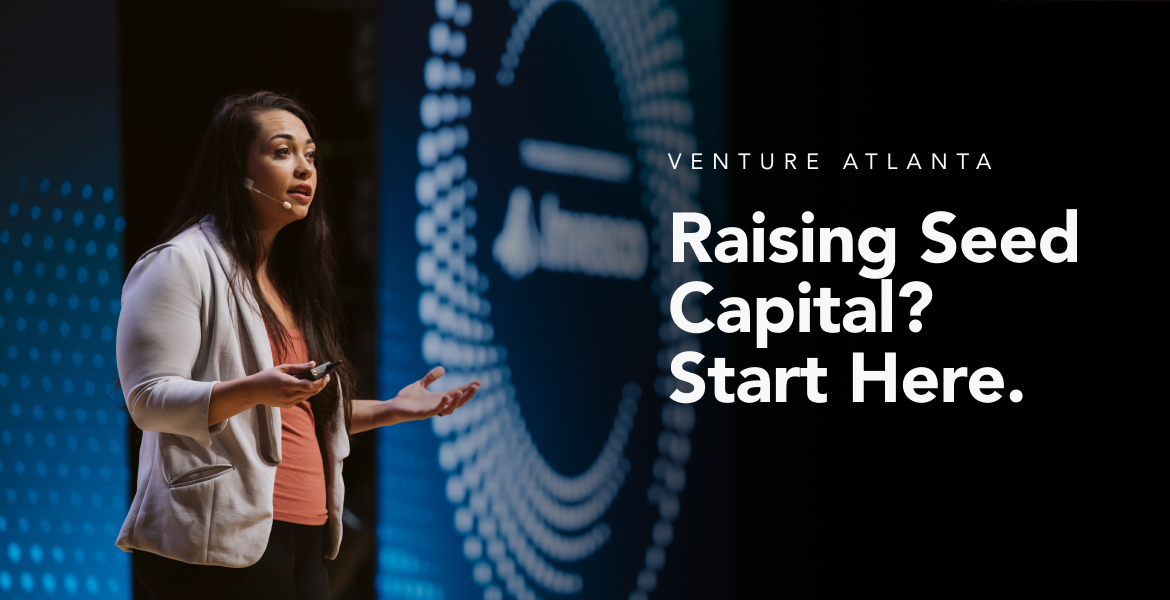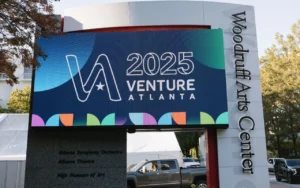If you’re a newly minted entrepreneur ready to raise capital, you’re probably wondering how to get seed funding—and fast. Navigating startup fundraising can feel overwhelming, especially when you're figuring it out for the first time. But here’s the good news: getting startup funding is more accessible than ever, especially if you know where to look and how to prepare.
In this guide, we’ll break down everything you need to know about seed funding for startups, highlight key Southeast investors, and show you why Venture Atlanta might be your biggest opportunity yet.
What is Seed Capital?
Seed capital is the funding that helps startups grow from an early-stage idea into a revenue-generating business. Unlike pre-seed funding, which often supports initial research and product development, seed capital is typically used to validate your product in the market, hire your first team members, and prepare for future growth.
Carta’s 2024 regional data shows the national median U.S. seed round size was $2.5 million in 2024. However, seed startup funding in the Southeast can be more modest. Our experts have noticed that seed funding often ranges between $1M–$2.5M, depending on the sector and traction.
Startups typically raise seed capital from angel investors, early-stage venture capitalists, or accelerators. The goal is to fund operations for 12–18 months and hit milestones that position you for a strong Series A.
Pre-Seed vs Seed Funding: What’s the Difference?
Pre-seed funding validates an idea or develops a prototype. This stage is often bootstrapped or funded by friends and family.
Seed funding, on the other hand, scales the validated idea. Investors at this stage expect a basic product, early user traction, and a clear go-to-market plan.
Who Invests in Seed-Stage Startups?
If you're wondering how seed funding works, the first step is understanding who provides it:
Angel Investors for Startups
These are high-net-worth individuals who invest their own money, often in exchange for equity. Angels are typically more willing to back riskier ideas early, and some may also provide mentoring.
This makes angel investors of high importance to startup founders, as they’re among the most flexible and accessible capital sources for early-stage startups.
Seed-Stage Venture Capitalists
Professional VCs operate investment funds and look for startups with the potential to deliver strong returns. While more selective, some venture capital seed funding firms specialize in early-stage investing. There are many Southeast investors, such as Knoll Ventures, Outlander VC, TiE Atlanta, and Las Olas VC.
Accelerators
Programs like Y Combinator and Techstars offer capital in exchange for equity and participation in a structured program. These accelerators often open the door to a large network of follow-on investors to help you during the seed funding process.
Friends, Family, and Acquaintances
When raising seed capital, many entrepreneurs turn to friends, family, and acquaintances who know them, trust them, and believe in their vision. There are often fewer hoops to jump through when raising capital from friends and family than traditional funding avenues, making it faster and easier for startups to get seed funding.
How to Get Seed Funding: 3 Proven Strategies
Here are the three seed capital tips you need to master to secure seed funding.
1. Perfect Your Pitch
Getting seed capital starts with a clear, confident, and compelling pitch.
Be ready to share:
- The problem you’re solving and your unique solution
- Your ideal customer and market size
- Financial projections and funding needs
- Your founding team’s unique qualifications
According to A Theory of Seed Financing (Weiss, 2023), investors prioritize founder-market fit, early traction, TAM (total addressable market), and clear growth potential. You’ll want to make sure that your pitch hits all of these points to get investors fully locked in.
Practice your pitch with mentors, advisors, or peers before you get in front of investors. You can also review the most common investor questions to prepare thoroughly, or take note of our six steps to help you stand out to investors while pitching.
2. Build a Strategic Network
Building relationships with the right people can open doors and create opportunities that might not be available otherwise.
Here are some ways to build a strong network:
- Joining founder networks like LinkedIn, AngelList, and Slack groups
- Attending local startup events in big Southeastern cities
- Reaching out to fellow founders who’ve raised capital and asking for introductions
Venture Atlanta’s Atlanta Startup Ecosystem Guide is a great place to find local support communities and events.
3. Attend a Venture Capital Conference
There’s no better place to meet investors than at events like Venture Atlanta, the Southeast’s largest venture capital conference. Each year, 1,500+ investors, founders, and corporate leaders attend.
Whether you're selected to pitch on the big stage or are simply attending to meet founders and connect with investors, you'll walk away with insights, connections, and possibly your next check.
If you’re ready to get on stage at Venture Atlanta, apply to pitch here. Looking to network with investors? Register to attend here.
Spotlight on Southeast Seed Funding Trends
Venture Atlanta kicked off the 2025 season with a sold-out event hosted and sponsored by Invesco QQQ titled “The State of Venture Capital and Building AI in the Southeast.” More than 200 investors and entrepreneurs gathered to discuss how the region is evolving, where capital is flowing, and why AI is becoming a defining opportunity for startups in the Southeast.
For founders wondering how to get seed funding in today’s market, it’s clear: the Southeast region’s infrastructure, talent, and capital access are ripe for breakout success.
Key takeaways included:
- Atlanta is on par with top tech hubs: Thanks to the democratizing power of AI, Atlanta offers the same innovation potential as Silicon Valley, with fewer barriers and more access to enterprise customers.
- Proximity to Fortune 500s is a game-changer: Atlanta has nearly twice as many Fortune 500 companies as San Francisco or Los Angeles, giving startups unique access to large-scale enterprise partnerships.
- AI is accelerating startup efficiency: Founders will soon build multi-billion-dollar companies with workforces of fewer than 100 people by leveraging automation and prescriptive tools powered by large language models.
- Cost advantages are real: According to investors, founders in Atlanta can raise capital at a ~30% discount compared to other major U.S. markets while operating with significantly lower burn.
- Atlanta ranks 8th in the nation for VC activity: Atlanta’s growth is boosting surrounding cities like Birmingham, Chattanooga, and Greenville, all of which are becoming credible startup ecosystems.
- Founders should resist early exits: Speakers emphasized that the Southeast’s next wave of breakout companies will come from founders who hold out for bigger wins, not quick flips.
- AI, fintech, healthtech, and logistics lead the pack: These sectors are drawing the most investor attention across the Southeast, with both early-stage optimism and late-stage interest returning in 2025.
Opportunities for Seed-Stage Companies at Venture Atlanta
One of the main opportunities Venture Atlanta provides for seed-stage companies is Startup Showcase Live!
If you’re wondering how to get seed funding, this is your answer. Startup Showcase Live is exclusively for pre-seed and seed-stage companies. The top 10 applicants get to pitch on stage to Venture Atlanta’s audience of 1,500+ investors, founders, corporations, and tech leaders.
The top 4 then advance to Day 2 of the conference, where they get to engage with a live Q&A with a panel of judges comprised of partner-level investors from firms across the country. These judges then determine the overall winner who will earn a $375K investment prize!
Sounds like something you’re interested in? Apply to pitch now for a chance to grow your company’s reach and secure seed funding.
Case Study: SmartWiz Wins Big at Venture Atlanta
At the 2024 Venture Atlanta Startup Showcase Live, SmartWiz, a cutting-edge AI-powered tax preparation software, walked away with a $500K investment prize.
Prior to pitching at Venture Atlanta, SmartWiz had already onboarded several mid-market customers and was actively piloting with Fortune 500 companies. Their pitch made it clear that they were solving a pain point deeply felt across industries.
Winning the pitch competition gave SmartWiz more than funding. They gained the exposure needed to accelerate partnerships and talent acquisition. Post-win, they closed a strategic pilot with a national logistics provider, expanded their product team, and doubled their MRR in under six months.
“We met our lead investor at Venture Atlanta. We had lunch right before they were heading to the airport, and the synergy was immediate. A few quick follow-up meetings later, they led the round. Within 45 days of pitching at Venture Atlanta, we had closed the round.”
— Jared Wilson, Co-Founder & CEO of SmartWiz
Read all about their win and how Venture Atlanta impacted their company’s growth in our recap of last year’s Startup Showcase Live.
How to Get Seed Funding: Attend Venture Atlanta
If you’re a seed-stage company looking to get funding for your startup, apply to pitch at Venture Atlanta. There is no bigger stage than at the Southeast’s largest venture capital conference. Connect with startup founders, 500+ investors, and grow your company’s breadth all in one place. The deadline to apply for Venture Atlanta 2025 is August 8.
Or, if you’re not ready to pitch and simply want to attend this year’s conference to network and learn from other founders, grab your ticket here.
We can’t wait to see you there!
Frequently Asked Questions
How much seed funding should startups aim to raise?
Plan for 12–18 months of runway. This varies by industry, but aim to raise what you need to hit milestones that get you to Series A.
How do I find seed investors in the Southeast?
To find seed investors in the Southeast, search for seed-stage venture capitalists in your area, or for regions like the Southeast, look to regional funds like Knoll Ventures, Las Olas VC, Outlander VC, and TiE Atlanta. Use the Atlanta Startup Ecosystem Guide and attend events like Venture Atlanta.
Is it better to raise seed funding from angels or VCs?
Angels are often faster and more flexible. VCs may bring more capital and strategic support, but also more structure. Many successful rounds include both.
What documentation do I need to secure seed funding?
Be prepared with a pitch deck, financial projections, cap table, go-to-market plan, and ideally, a minimal viable product (MVP) or early traction data.


